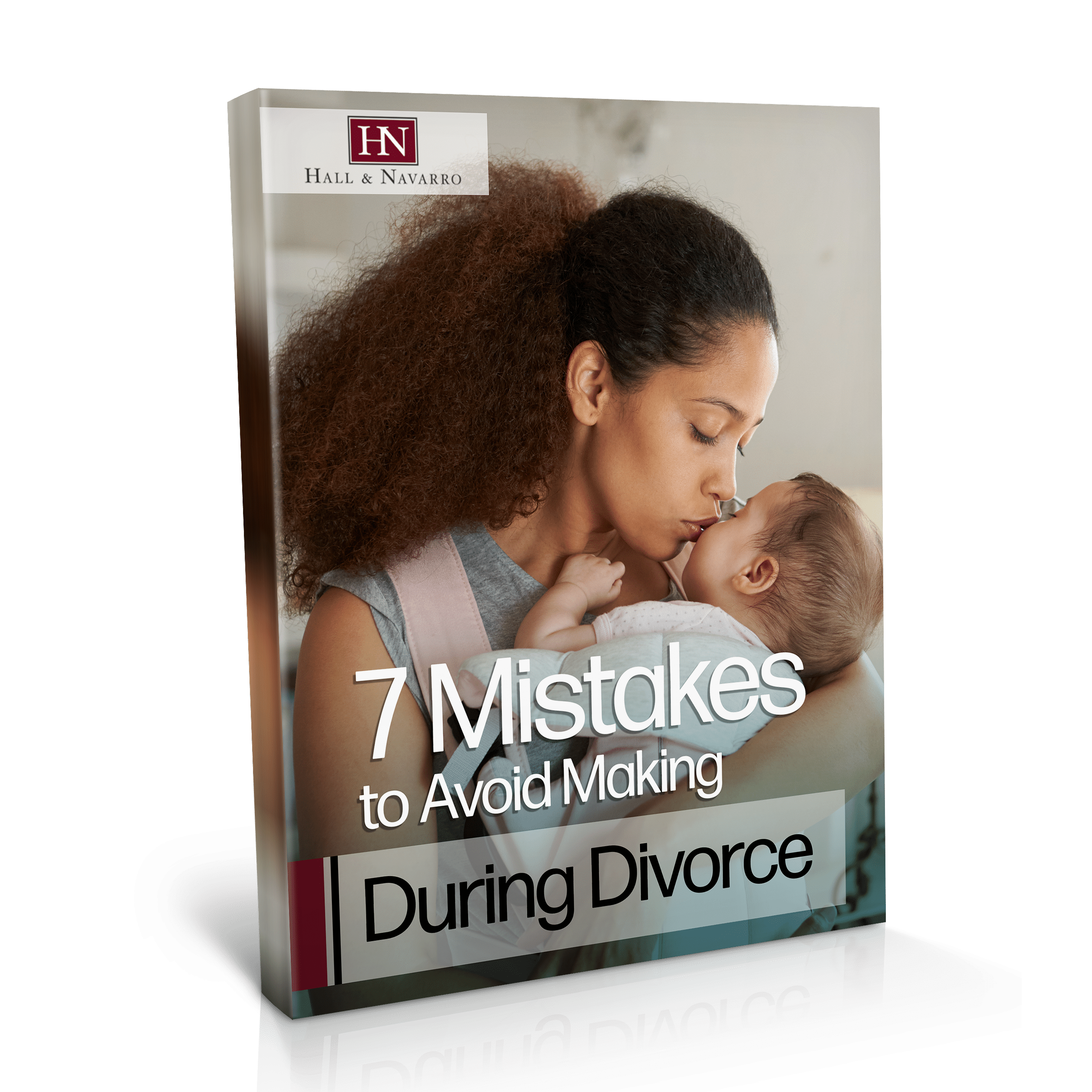Alimony Lawyers
Georgia Alimony Lawyers
Fearless representation
Divorce has the potential to be both emotionally and financially draining. Alimony may be a primary concern of yours, whether you are the breadwinner or you have never worked because your spouse does. Either way, there are options, and we can help you navigate them.
Let our family handle your family’s needs. Call the Georgia family lawyers at Hall & Navarro today to get started.

Learn more about alimony:
Watch this video.
Considering divorce?
Download our free guide.
There are 7 mistakes you should avoid making during a divorce.

Top Rated Family Lawyers in Georgia
Over 100 5-star reviews on google









How is Hall & Navarro different?
Prepared to Win
No matter what, we approach every case prepared to win. This has been our driving force from day one, and still carries us forward today.
Breadth of Experience
With more than 75 years of combined experience in a variety of practice areas, we are frontrunners of law in Southeast Georgia.
Fearless representation
We put everything forward, and take nothing back. We are a united front, rallying behind and in front of every client.
How alimony works in Georgia
Alimony is awarded when the judge determines it necessary. There has to be a need for alimony for one party. You and your spouse can both request alimony, but it is actually just a one way thing. You may need to discuss the matter further with one of our Georgia alimony lawyers to see what the circumstances of your case look like. The following are factors that the court will put into consideration when determining alimony:
- What each party’s living situation has been during the marriage
- How long the marriage lasted
- How old and healthy each party is
- The finances of each party in the marriage
- How long it would take the dependent party to get the training and/or education necessary to become gainfully employed
- How much each party contributed to the marriage through things such as childcare, support, education, etc.
- What each party will have in separate property when the divorce is finalized
Georgia also takes into account why the marriage ended when determining alimony. If the party who would have been receiving alimony caused the marriage to crumble, they may be denied alimony or offered reduced alimony. Committing adultery would be one reason for this to happen. The victim of the adulterer may even be awarded permanent alimony. It is essentially up to the judge to determine what is fair.
Types of Alimony That Are Available in Georgia
Alimony in Georgia can be classified as either temporary or permanent. Temporary alimony is given if, during the divorce, one party needs help financially. As you may have heard, divorce can be a long process, sometimes taking up to a year. A party in the divorce may need temporary alimony during this period of time so they can adjust to living without their spouse.
While a lot of couples both work these days, there are still many who are full-time parents, while their partner works full time. It can feel overwhelming to be without financial support during the divorce process. The court tries to create fairness in this difficult time for the dependent party. There may be permanent alimony after the divorce is finalized, but that is based on what the judge determines to be fair.
If you’re the one who would most likely be paying the alimony, the idea of permanency can be troubling. Do note that if this is what you wind up with, it doesn’t necessarily mean you pay alimony until you die. It can be contingent on the other party getting a job or education so they can become gainfully employed. Negotiation is when the topic of alimony will be resolved.
Schedule your consultation.
Speak with one of our dedicated team members by filling out the form below.
More alimony Info
How alimony gets paid in Georgia
Alimony payments are usually made either weekly or monthly until it is ordered by the court to stop. It is less common, but not unheard of, for a spouse with more means to give the other spouse a lump sum of the alimony. It is not necessarily a realistic option for most people because the amount can be quite high. You certainly can ask one of our Georgia alimony lawyers about it, if you feel you are able to do this.
Again, the payments are typically weekly or monthly and will be taken out of the spouse’s income and deposited directly into the other spouse’s account. It will function similarly to how taxes are deducted from income. Instead of the money going to the government, it is going to pay off alimony.
Making modifications or ending alimony
In most cases, either party can request that the alimony agreement get modified or terminated unless there was some sort of written agreement that said changes could not be made. The reasons for changing alimony must be substantial, such as one party getting let go from a job, getting a better paying job, moving in with someone new, etc. If the spouse who is receiving alimony gets married, the party paying that alimony automatically does not have to do so anymore. Also, if the alimony was temporary for a spouse during the process of divorce, it will end as soon as the judge finalizes the divorce.
How long does alimony last?
In Georgia, there’s no set formula for how long alimony lasts or how much alimony can be for every month or every year, so long as alimony exists. It oftentimes, based on your circumstances and your facts, will be determined that alimony should last for X number of years.
If you have not been married for ten years or longer, alimony may not be on the table for you. If you have been married for longer than ten years, especially if you get past 20 years of marriage, then the court will likely look at an alimony obligation and determine how long the alimony should last.
There are lots of factors that could go into that, including whether your spouse is employed or could be employed, and whether with some schooling or education they could go into the workforce and make a substantial amount of money. Depending on these factors, the alimony may be set for three to five years to allow them to transition into the workforce and/or get an education to move along in their financial status.
However, if you have someone who’s elderly and not going to enter back into the workforce, you may have alimony obligations for a longer period of time. Even so, it’s very rare now that alimony lasts a lifetime. However, Georgia law still does allow that. A judge may say, based on the circumstances, that alimony should be endless until at least the other person dies or remarries. In that circumstance, there may not be a year or a time period that alimony would cease.
However, it’s more normal, and especially in our circuit or with our local judges, that they’re going to designate a number of months or a number of years that that alimony is going to last. That’s going to be based on how long you’ve been married, and one spouse’s need versus the other spouse’s ability to pay. They also factor in any kind of facts such as educations or other means as you transition into divorced life.
Are there different types of alimony?
Yes, there are different types of alimony in Georgia: lump sum and periodic. Each has pros and cons.
For a lump sum alimony, you may want a one-time payout for a piece of property or another investment account. You may want all the control of that alimony so that you can invest it, reinvest it, spend it the way you wish, or purchase a home if you have moved out of the marital residence. That lump sum alimony is a one-time payment.
There’s also periodic alimony, which is paid out throughout a certain period of time as established by the judge and at a certain monthly or yearly amount. That circumstance may benefit you because it helps you live the lifestyle that you’ve already established, and you can count on that payment for a certain period of time.
Now, there is alimony in Georgia that can be modified by the court if there’s a change of circumstance. Some people don’t like that option. They don’t like that they don’t know for sure for a period of time that they’re going to be receiving this alimony payment, which is why some people would rather get more money upfront in a lump sum amount or maybe more money for a shorter period of time.
Ultimately, if you’re negotiating, you can talk about those different types of alimony with the other side and reach an agreement. By the time you go to a trial, you would want to have already established in your mind what type of alimony you would want and what better benefits you so that we can ask the court for a specific type, whether it’s lump sum or periodic alimony.
